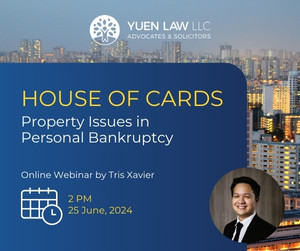This article discusses issues of right of survivorship arising from joint property and joint bank accounts.
“My HDB is in joint names and so are my bank accounts so I don’t need to do a Will.”
Is that correct?
It is common to hear people saying “My HDB is in joint names and so are my bank accounts. I do not need a Will” these days. The thought might have even crossed your mind too.
But is that statement correct? In short, not quite. The idea that your intended beneficiaries inherits your property and funds automatically and fuss-free may not be true in all cases.
Let’s break it down in 3 steps since the statement has 3 parts:
- 1. Property in joint names;
- 2. Bank account in joint names;
- 3. The need to do a Will.
Property in joint names
Whether you own a HDB, condominium or landed, there are only two ways to own Property in Singapore, as Joint Tenants or as Tenants-in-Common.
When people say they are Joint Tenants they usually mean to say that they are Joint Owners of the Property. The rights of survivorship are a feature of Property if it is held as Joint Tenants.
If you recall owning a share of a property, for example, 50% of a property, then you would be a Tenant-in-Common. If you hold as Tenants-in-Common with separate shares (e.g. 50%-50% or 60%-40%) this does not apply to you.
If John & Jane are Joint Tenants, and John dies leaving Jane surviving, Jane will become the sole owner. This is because from the start when they are registered as Joint Tenants, John & Jane both own 100% together with no separate shares. This is commonly the case when married couples buy Property so that if should one spouse die the surviving spouse automatically becomes the sole owner at law. The title to the Property needs to be updated with the HDB or SLA for private properties.
So far, so good, in that if John passes on first, then Jane will become the sole owner of the property. But, What happens when Jane also passes on? Jane also need to do a Will. When I give talks, one statement I hear from elderly ladies is – “ My husband has a Will, therefore I do not need to do one.” This is not quite true. If you co-own Property as Tenants-in-Common, you should also do a Will do ensure it is distributed according to you wishes.
Bank account in joint names
Many people make the mistake of assuming that the rights of survivorship in Joint Tenants also applies to their bank accounts where they are joint account holders. This is not necessarily so.
One of the big differences between Property and a bank account is that a bank account is fundamentally a contract between you and the bank to deposit monies with the bank.
Whereas, Property is governed by Land Law. Joint Tenancy and the right of survivorship is a Land Law principle and does not apply to bank accounts. If you read terms and conditions of the most local banks carefully you will observe that the terms are very clear on how your joint bank accounts can be operated as the issue of authorization for withdrawal or payment is of vital importance to both bank and their customer. However, when it comes to the issue of ownership of the funds in the bank account it is often less clear since the terms and conditions are not meant to be for this purpose.
Many local bank terms and conditions entitle the bank to credit the funds to the surviving joint account holder, if the other account holder dies. But this is not the same as saying the joint account holder is the owner of the funds. The bank is entitled to do so, but the bank may choose not do so if they are of the view that the ownership of the funds is unclear or disputed.
| Extract from a Bank’s Terms and Conditions Operation of Joint Account:-
If any one Account holder dies, the Bank is authorized to hold any credit balance in the Account to the order of the surviving Account holders. In addition, the Bank may if any holder dies, suspend or close the Account without further notice. |
|---|
When an account holder dies, the banks routinely require the executor or administrator to produce the Grant of Probate/ Grant of Letter of Administration (“the Grant”). Banks do this a safety precaution as they only want to pay to the authorized person. The person named in the Grant is legally the authorized person by the Court. Once the bank pays to the person named in the Grant the bank has discharged its duty.
The need to do a Will
To sum up, it is wise to do a Will and include your Property even if it is held as Joint Tenants. For your joint bank accounts you should include them in your Will, unless you are certain the bank terms and conditions provide a clear right of survivorship.
Here are some commonly asked questions.
What happens if I have a Joint Account and I don’t do a Will?
If the terms and conditions clearly state that there is a right of survivorship then it should not be a problem and it is likely that the bank will allow the surviving joint account holder to withdraw and close the account. It is highly recommended that you check with the terms and conditions and also with the banks policies if you are unsure.
If the terms and conditions of your Joint Account are not clear and you do not have a Will, the ownership of the funds therein it can be disputed. This is often the case where the one that died provided all the funds and the survivor did not.
Should I declare Joint Accounts when applying for a Grant?
As an Executor or Administrator it is your duty to declare all the assets of the deceased when applying for the Grant. It is highly recommended and safer to declare all Joint Accounts of the deceased as part of the Schedule of Assets. Omissions may result in the Bank not recognizing you as having authority to deal with the Joint Account as the Executor or Administrator as it was not declared and not part of the Grant authorizing you. An application to amend would have to be done to include it thereby incurring legal fees and more time before you distribute the assets.






